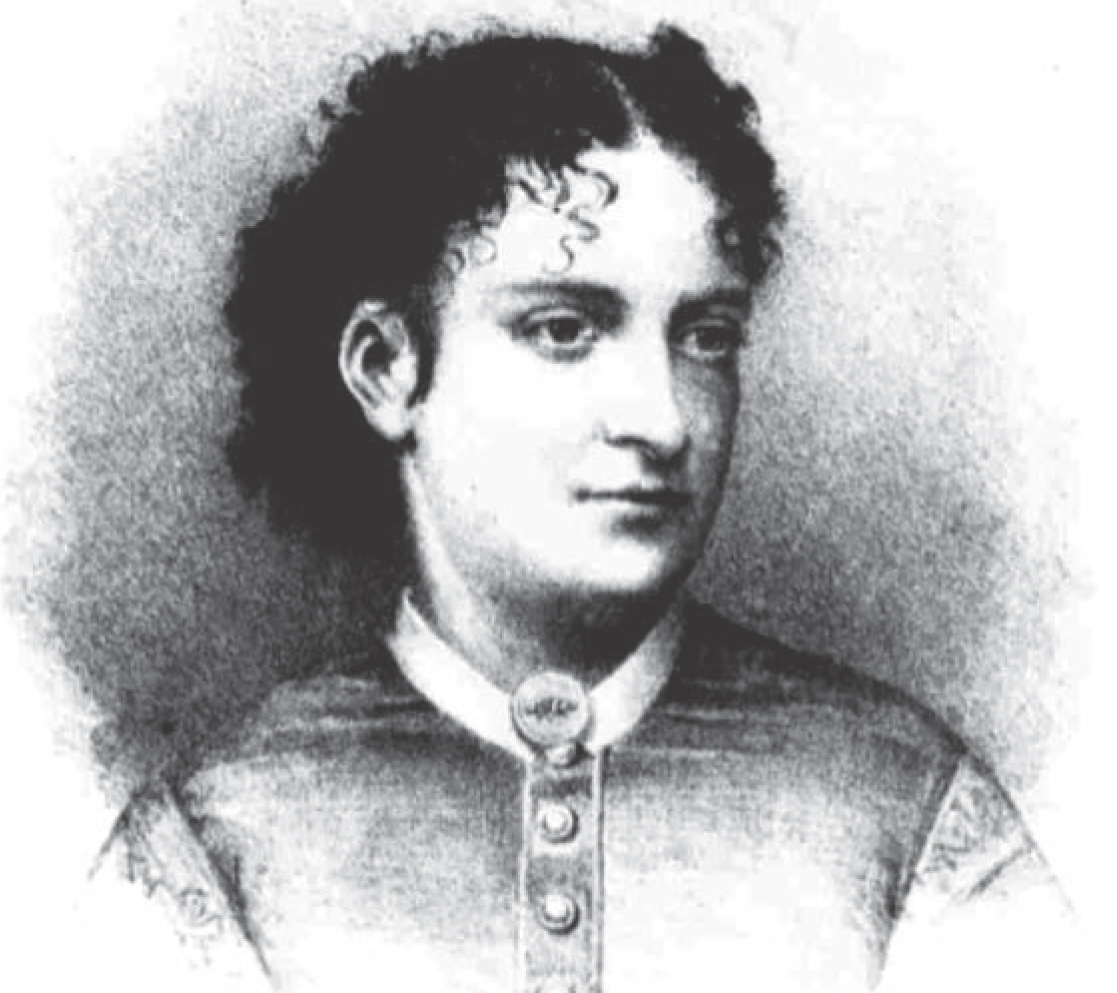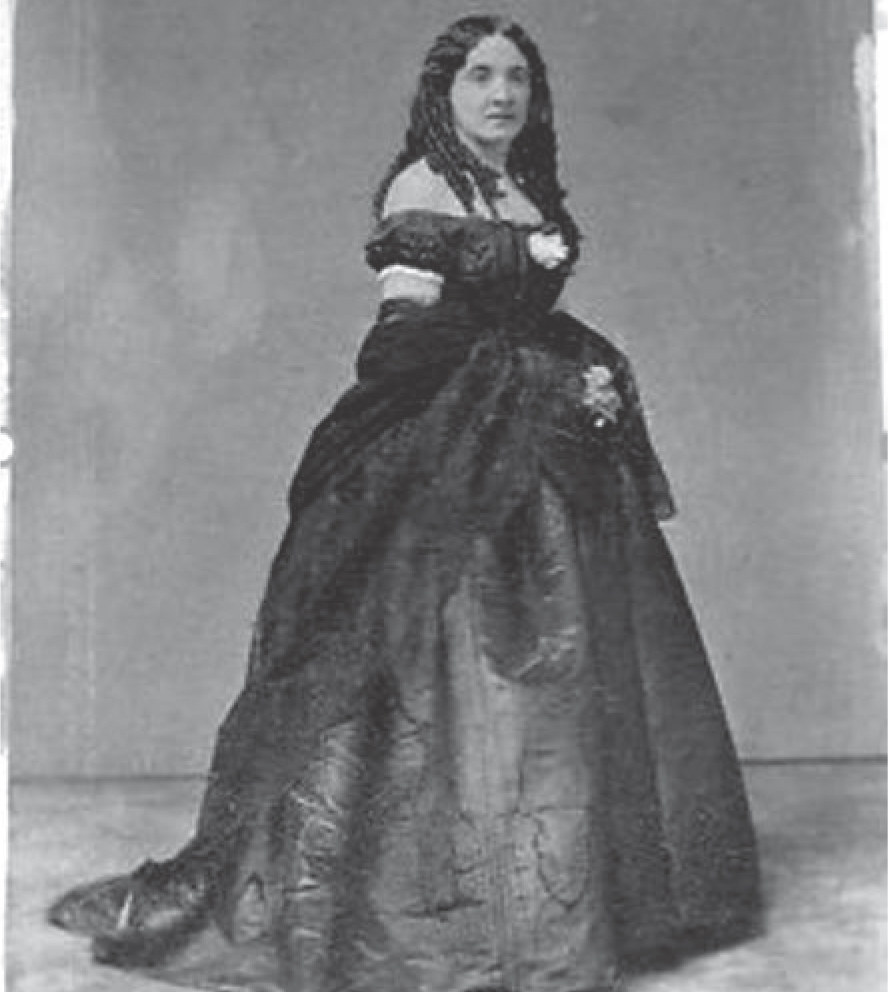“Dashing, laughing, laughter-making,” Effie Germon was eighteen, “in the bloom of youth and beauty.” “Her face was fresh and girlish, with hair combed down over her temples and ears.” Theatre critics called her “Pretty Effie Germon.”1
Born in Augusta, Georgia, in 1845, Euphemia “Effie” Germon was related to the Jeffersons, one of the oldest theatrical families in America.2 Like her mother, Jane Anderson Germon,3 Effie began her acting career when she was very young. In July 1857, at twelve, she made her debut at the Holliday Street Theater in a little-known play, Sketches of India, as Sally Scraggs.4 The following season she landed a job with Laura Keene’s company in New York as Augusta in the first American performance of Our American Cousin. Keene felt the diminutive actress (she weighed only 90 pounds at the time)5 was too young for the part and didn’t keep her on. Weeks later Effie was hired on as a stock actress with Edwin Booth and John Sleeper Clarke at the Walnut Street Theatre in Philadelphia.
At fourteen Effie was still too young to play Augusta convincingly, but she wasn’t too young to fall in love with handsome, seventeen-year-old, virtuoso violinist, Carlo Patti.
It was a truly whirlwind romance. Three months after Carlo came to Philadelphia, Effie and Carlo ran off to Providence, Rhode Island, to get married. The famous violinist was too young to marry, the Providence Evening Press complained. “The young rogue can’t be more than twenty.”6 No one seemed to care that Effie was even younger. Like so many teenage marriages, it was doomed from the start. Carlo had the proverbial roving eye. The couple soon separated and later divorced.
By 1862, seventeen-year-old Effie Germon had made a stage career for herself as a “soubrette,” a mischievous, flirtatious coquette. It was a role that came naturally to her “genuine sense of humor” and “sparkl(ing) wit,”7 and one that that kept “the ‘Johnnies’ busy”8 in Montreal when she played there. The “Johnnies” were the not-so-secret agents of the Confederate government who had set up headquarters in the Canadian city.9 When that engagement ended, Effie left for Grover’s Theatre in Washington to co-star with the “eminent young American tragedian, J. Wilkes Booth.”10 After their appearances at Grover’s Theatre ended, John asked Effie to be his leading lady for a new venture he was undertaking at the Washington Theatre. She agreed.

Effie Germon at age twenty-six, six years after her affair with John Wilkes Booth. Courtesy of Library of Congress.
Effie was not the only leading lady John invited to join his troupe. He also hired Alice Gray.11 Since a company only needed one leading lady, John had something more in mind than just filling acting slots when he hired them both.
None of John’s contemporaries ever mentioned any romantic relationship between John and Alice or Effie. There are no known letters they exchanged. There is nothing to indicate they were romantically involved at all. Nothing at all—except that Alice’s and Effie’s photos were in his pocket when he died.
![]()
There is another reason Alice Gray is in the history books. She was the last actress to appear with John at his final performance on March 18, 1865, at Ford’s Theatre, a month before John shot Lincoln. The play was The Apostate. John played one of his signature roles, Duke Pescara. Alice was Florinda, the love interest.12
Alice Dehan, who later took the stage name Alice Gray, was born in 1835 in upstate New York, outside Buffalo, to Irish immigrants Patrick and Ann Dehan.13 A short time after Alice’s father died in late 1849, Alice and her mother and brother moved to Boston.14
Like many young women whose mothers were left with no support, Alice had to go to work to help out. Luckily, she found a job in the theatre. In June 1849, at age fourteen, she had her first acting role under the name Alice Gray in Old Job and Jacob Gray at the Boston Museum.15 She would appear in that same play in various age-appropriate roles for the next seven years.16
Alice had not just picked her stage name out of a hat. “Alice Gray” was the name of the girl every man longed for and could not have in a popular ballad of that time. The song’s refrain, “My heart, my heart is breaking / For the love of Alice Grey,” invariably appeared alongside Alice’s name whenever she was mentioned in the newspapers.17
After leaving Boston, Alice took a job as the lead stock actress at the Metropolitan Theatre in Buffalo.18 The next season she was at the Bowery Theatre in New York. Despite her favorable reviews, the country was still in recession, and the Bowery closed. In May, Alice was back in Buffalo at the Metropolitan Theatre. It was not an auspicious reappearance.
Alice was unaware manager Tom Carr’s wife was jealous her husband was paying too much attention to the young actress. She began plotting sabotage. When Alice opened as Lady Teazle in School for Scandal, she was barraged with loud and persistent hissing from the audience. Alice didn’t know what was wrong. She stood on stage and appealed to the hissing public to let the play go on, but the hissing continued. There was nothing else to do except bring down the curtain.19
The New York Clipper’s correspondent thought it was genuine dissatisfaction with the young actress.20 Two weeks later the New York Clipper apologized. Alice had not been hissed because of “any want of merit.” “‘We say nothing’ about rumors of jealousy,” the newspaper added, implying more than if it had.21
Alice knew there was no point in her staying. Carr agreed to release her from her contract. By coincidence John’s sister-in-law, Clementina DeBar Booth, was her replacement.22
Two weeks later, Alice landed a job for a few weeks as a stock actress with Edward Eddy (Henrietta’s future husband) at the Broadway Theatre then went on to play at the Washington Theatre. Although she had only been on Broadway for a few weeks, the advertisement for the Washington’s opening night boasted Alice had just come “from the Broadway Theatre, N.Y.,” enhancing her and the theatre’s status.23
Reviews were mixed. As the leading lady to superstar Barry Sullivan in The Gamester, she was praised for the “truly womanly conception” of her part and a “natural pathos rarely equaled.”24 In King Lear, she was “nothing great.”25
The next season Alice was in Charleston, South Carolina, as leading lady with C. F. Marchant’s stock company. “She possesses all the requisites for a fine actress; youth, beauty, and talent,” the New York Clipper told its readers. Unable to keep from punning on the popular ballad, the newspaper added, “many a Southern ‘heart is breaking for the love of Alice Grey’” every time it mentioned her name.26
While she was breaking hearts, Alice came down with yellow fever, a disease that plagued the South.27 After a two-month convalescence she felt well enough to go back to work. A local critic praised her “fine histrionic talent, delicate womanly perception, correct and clear enunciation, lady-like carriage, graceful person, winning countenance, and speaking eye.”28

Alice Gray. Courtesy of U.S. National Park Service.
In summer 1860, John Ford hired Alice as the leading female stock actress for his Holliday Street Theatre company. It was Ford’s intention, the Baltimore Daily Exchange told its readers, to open the new Holliday Street Theatre season with the young and beautiful Miss Alice Gray as leading woman, reputed to be “possessed of more than ordinary professional talent.”29 Alice did not disappoint. The Baltimore Sun praised Alice for her “quite unexpected grace [and] talent” for which she was applauded by the audience. “She is a brilliant accession [to the Theatre].”30
Alice was the leading lady at the Holliday Street Theatre again when John opened in March 1863 in Richard III with John as Richard and Alice as Queen Elizabeth.31
John was impressed (and perhaps libidinous) enough to hire her along with Effie Germon a month later as one of his leading ladies for his brief venture as manager of the Washington Theatre.
The critic for the Washington National Intelligencer did not say anything about Effie’s performance. What “particularly impressed” him was Alice’s “beauty and spirit”32 and John’s “strong passionate” role in The Robbers, a performance that “would not soon be forgotten by anyone” in the audience.33
Among those who would not forget was twenty-two-year-old Lucy Hale, the daughter of New Hampshire Senator John Parker Hale. She was impressed enough that she sent him a bouquet of flowers.34 Lucy would see a lot more of John; it was a passing appreciation for now. John said goodbye to Alice and Effie and left for his next engagement in Chicago.